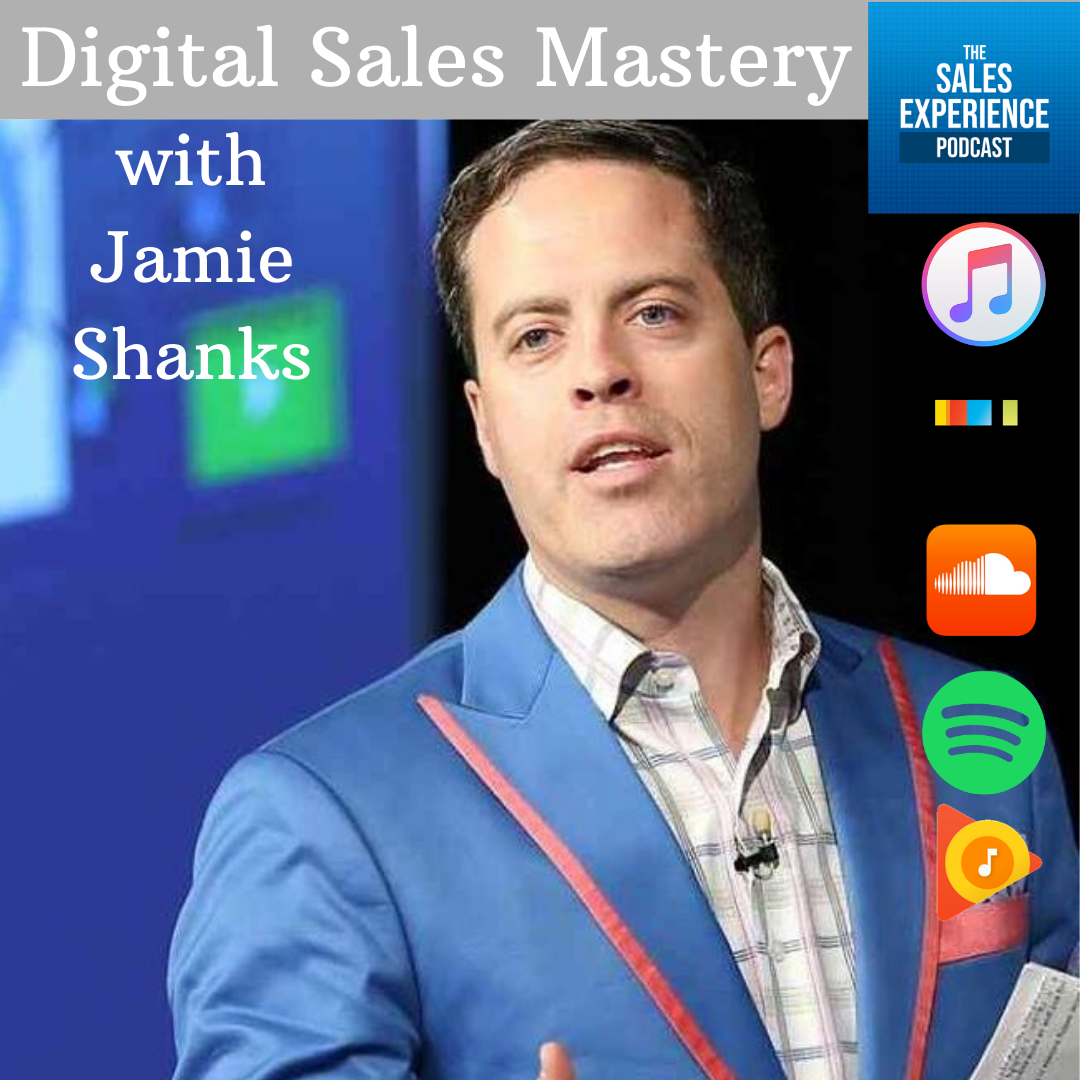Show Notes
“Sell me this pen.”
Despite what hiring managers think, and what movies have shown people, this is not the best way to know if someone can sell.
I cover why it’s not effective and what works way better to assess if your candidate can actually sell.
Episode 75 – Transcript
Welcome to the fifth and final instalment of recruiting week. This is episode 75 this is the sales experience podcast. My name again is Jason Cutter.
So glad that you’re here. So excited. If you’ve been going through this whole week, we’ve been talking a lot about recruiting, which can apply to both recruiting managers, HR sales managers, but also to the employee, to the applicant.
If you’re a candidate, you’re trying to get a sales job, you want to get into sales or you’ve been hired for a sales job at this point right now you’ve got one. At some point you’re probably going to change companies and so all of this is important to understand and know both how to be successful in your current role in your career as a sales professional and then also things to look for as you’re going after other jobs.
You’re making a change, you’re going through a process with the company because as much as they’re interviewing you, you are also interviewing them and I’ll tell you, life is too short to do something you don’t like or work somewhere you don’t enjoy.
And so you want to make sure as a candidate that you want to be there as much as they want you to be there. Don’t get oversold on a job if you don’t get a good feeling if you don’t think it’s going to be a good fit. Today, what I want to talk about in this episode is the classic, I think this is a terrible interview question, which is sell me this pen. A lot of sales organizations do it.
It’s been in some movies, sales managers, recruiting managers think it’s cool. They want to see what people come up with. In my opinion, there’s two ways, maybe three ways that this is going to go. One is everyone’s seen the movies or researched it online. Literally you can go and watch YouTube videos about how to sell me this pen and how to do it perfectly and then be amazing.
So if somebody does that and knows exactly what to do, then either that tells you as a recruiting manager that they’re amazing at doing research or they want to make sure they do it right, but that’s not authentically how they think. Now they’re just giving you the answers they think you want and they’re not being themselves who maybe they can’t sell pens, like maybe that’s not who they are.
On the other end of the spectrum could be the people who they can’t sell you a pen. Like you say, sell me this pen or sell me this notepad and they literally fall apart and they’re a mess. That could be a good indication that they don’t have the sales skills. However, I don’t think that’s super fair because maybe you’re testing to see if they have that sales chops as a fundamental or the experience they’re coming with.
But unless you’re selling pens and you’re trying to hire people who only have pen selling experience, then you’re going to teach that person how to sell whatever your product or service is. And so there’s other questions and other things that would be fundamentally better to put them through. Now there’s the middle category, which is the people you say, sell me this pen.
They’ve never really heard about that before and they actually do a good job and you can see who they truly are and of course that’s great, but again, is that the best way to go? In my experience has just from hiring, looking at lots of interview processes, studying it within many organizations. I don’t think that’s really the best thing to be looking for. You know, I think there’s a lot of standard interview questions, which people are just going to have canned responses for us.
You always want to watch out for that. For me, in my interview process, as I mentioned a couple episodes ago, I’m really about fundamentally finding who the person is and picking up on the things that are going to be applicable and beneficial for what we’re hiring for and the things that are going to be challenging. I want to know who they are.
What I really want to do is I want to test them in the interview for how they think, you know, thinking on the fly, selling me this pen and you know, being able to come up with this sales pitch on the fly is great. I think one of the better things to do is to really look at what they’ve done in the past as it relates to what you are selling now and okay, so maybe they have completely different experience but they have anything close by.
I think a better question ago is, all right, so you used to sell x, why don’t you sell me that? Like walk me through your process, tell me the script you use to use. Pitch me like I’m a prospect trying to buy washers and dryers, like whatever it is that used to sell, sell me that and then see how that process goes. See if their style matches what you know of your style for your organization.
That’s a much better fit because let them be them, let them do what they do best. Instead of try to throw out this be in my experience scenario at them of selling the pen. Again, if you’d say, sell me the pen, you got the people who cram for the test and you’re not seeing who they really are. You got the people who just fail and that may or may not be a bit applicable.
And then you’ve got the people who pass and it’s really about what matters to you. If you say sell me Washer and dryer like you used to do, they’re going to go into their mode, they’re going to be comfortable. And what you’re going to see is they’re not going to put on a front, they’re going to be who they are in the sales process.
Do they go into a long pitch and a monologue to start out where they tell you how amazing and great they are, which I actually covered last week and I think is a terrible strategy that, people do. Or are they going to ask you lots of questions to start out figuring out what you need, how big your family is, how big your space is, what you need a washer and dryer for what kind of clothes, how dirty things get.
Do you have work clothes? Do you have delicate? Are they going to do an analysis? They can ask lots of questions. They get to figure out the root of what you need, what your budget is, and then they’re going to advise some solutions. What it really comes down to and what you’re really looking for is how do they sell what they used to sell? What is their process? What do they say? How does it feel?
How do you feel as the potential prospect and then how does that relate to what your company does and what you no works well for a sales person, for an account executive in your current role. That’s the most important thing, and again, there is no right or wrong.
If you know that your product or service is sold really well by long monologues in the beginning where there’s a lot of education that needs to take place because somebody, the prospect doesn’t really know about you or the service you provide or the problem you’re solving and so there’s education then that’s important to you and you want to make sure you’re hiring people who are okay with that, who are okay with educational, you know, kind of speeches and intros in the beginning to get people interested or excited or understanding it and then go into the questions.
If you know that doesn’t work for you, then you need more of a question-based one. If you’ve gotten a sales cycle, short sale cycle, it’s just got a match for you. What makes sense and when you’re hiring salespeople, the number one thing I’ve found that to be most successful as far as questions go is having them sell what they’ve sold in the past.
That’s relative to what you do now and seeing how that goes and is that a match for you now? I will tell you, and I’m not going to go through it on this because I don’t have time in this episode, but if you want my one killer recruiting technique question, it’s actually a, I call it a game, although they don’t always think it’s fun. If you want that one thing that I do every single time and literally I’ve done this for years and nothing else matters other than this one thing.
I base almost my whole decision on hiring somebody just on the results of this one game. Air quotes. If you want that, send me a message through Keter consulting group.com you know, send it through the context. Send me an email, find me on LinkedIn and then just say recruiting game in the message and then we can hop on the line and chat about it. Or I can send you a message and explain it.
But outside of that one crazy game, the single question that’s really important outside of why they want to be there, why they want the money. If you’re looking at sales technique, this is why the sell me this pen. It’s like I want to see how you are as a sales person, not as a person, you know, not as in your life and your goals and your dreams and your hopes, but how are you at the actual technique of sales.
I want you to, you know, sell me what you sold in the past. Just do what used to do. Walk me through it, take as much time as you need and let’s just go through it and see how it goes. The other part I want to bring up, which ties in with what I covered yesterday in practicing like you fight, you know as per the military is that when you’re doing sales and when you’re testing someone in their sales process, make sure that it fits the mode that you’re doing.
If you do in person interviews and you tell someone to sell you something or talk to you about what they sold in the past and you’re doing that face to face, but you have 100% phone job that’s not fair on two levels on one, maybe they’re really good on the phone and the face to face is really gonna throw them off.
Plus interviews, it’s already nervous. You know, there’s a lot of pressure and so that’s not always the most accurate, but on the other end you also don’t get a feeling for how they are on the phone. Some people sound really good in person, do really well vibe off of somebody in person and rolling with things over the phone.
They’re not listening, they’re not picking up on cues and they’re just not a good phone salesperson. Always make sure that you’re doing a part of your interview and the sales part, especially when it comes down to this sales test, it’s why I’m bringing this up now. When you’re testing them or asking questions about selling or having them sell you something, have it match the sales process you’re actually doing at your company.
If it’s over the phone, make sure you ask this question of them over the phone and see how it feels to be a prospect with them over the phone.
If you’re like, yet it sounds good, let me grab my credit card, you know, have my money. Then you know that they are going to be a good fit for you over the phone. If you’re going through the phone call and you’re like, this is like pulling teeth and this is terrible and I want to stop talking to you right now, it’s not a good fit. Same thing in person.
If you know in person it’s going really well. Then you put them in front of anybody else and you know they’re going to do well. Hopefully that helps you their recruiting.
Thank you for listening to this episode this week. Make sure to subscribe. iTunes, Stitcher, Spotify, Soundcloud, Google on the cutter consulting group.com website. The sales experience podcast is also on LinkedIn if you want to follow it there and get updates, special episodes, anything like that. I appreciate you being here. Thanks for listening for another week. This closes recruiting week, and as
Always, remember that everything in life is sales and people remember the experience you gave them.
![[E75] Recruiting Week: Stop buying pens](https://episodes.castos.com/salesexperiencepodcast/images/TSEP-Cover-Recruiting-Week-1.png)


